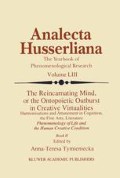Abstract
Lyric poetry takes subjective consciousness as a condition of its content, certainly since romanticism, but arguably back to the origins of modernity. In this way, it has served the purposes of a formalist aesthetic in which poetic speech instantiates subjectivity in that larger Hegelian sense of the “ideal becoming the real.” However, this intrinsic conception of lyric presents some obvious difficulties for psychoanalytic interpretation. Pointing to defenses, resistances, and discursive distortions, psychoanalysis exacerbates disparities in the relation of speech and content. It seeks to discover motivations based on unconscious ideas, emotions, and impulses, even if it grants the difficulties of distinguishing various kinds of unconscious articulations. This emphasis on contradictory motivations contrasts with perhaps the most salient generic expectation of lyric: a subjective wholeness in which a speaker reflects on an experience and transforms that reflection into insight, into self-understanding — transforms it, that is, into a lyric “subject.” Put in another way, the pathos of self-presence, of self-understanding, of the subject-who-knowsherself, is central to our generic understanding of lyric, even if that presence is only implicit in the authorial judgment of an objectified speaker of intractable unreliability, as in the dramatic monologue. Hence, vigorously symptomatic readings seem to outrun the subjective closure that formal closure enforces in the lyric. As a result, even though lyric poems present in richly impacted form the deflections and delusions that are the hermeneutic plunder of psychoanalytic interpretation, the interpretation of lyric has lagged behind the kinds of readings suggested by the post-structuralist narrative of fragmentation with which psychoanalysis is so obviously consonant, especially Lacanian psychoanalysis, with its myriad versions of the letter in sufferance.
Access this chapter
Tax calculation will be finalised at checkout
Purchases are for personal use only
Preview
Unable to display preview. Download preview PDF.
References
Bracher, M., Lacan, Discourse, and Social Change (Ithaca: Cornell University Press, 1993).
Cavell, M., The Psychoanalytic Mind: From Freud to Philosophy (Cambridge, MA: Harvard University Press, 1993).
David-Menard, M., Hysteria From Freud to Lacan: Body and Language in Psychoanalysis. Trans. Catherine Porter (Ithaca: Cornell University Press, 1983; 1989).
Freud, S., “Unconscious Emotions.” In Standard Edition of the Complete Psychological Works of Sigmund Freud. Vol. 14, 1915. Trans. and ed. J. Strachey et al. (London: Hogarth Press, 1966–1974).
Freud, S., “An Outline of Psychoanalysis.” In Standard Edition of the Complete Psychological Works of Sigmund Freud. Vol. 23, 1940. Trans. and ed. J. Strachey et al. (London: Hogarth Press, 1966–1974).
Grigg, R., “Signifier, Object, and the Transference.” In Lacan and the Subject of Language. Ed. E. Raglund-Sullivan and M. Bracher (New York and London: Routledge, 1991).
Holland, N., The Critical I (New York: Columbia University Press, 1992).
Jacobson, E., Drives, Affects, Behavior, Vol. I. Ed. Rudolph Loewenstein (New York: International Universities Press, 1953).
Lacan, J., Ecrits. Trans. Alan Sheridan (New York: W. W. Norton, 1977a).
Lacan, J., The Four Fundamental Concepts of Psychoanalysis. Trans. Alan Sheridan (New York: W. W. Norton, 1977b).
Lacan, J., The Seminar of Jacques Lacan, Book I: Freud’s Papers on Technique, 1953–1954. Ed. J.-A. Miller. Trans. J. Forrester (New York: W. W. Norton, 1991a).
Lacan, J., The Seminar of Jacques Lacan, Book II: The Ego in Freud’s Theory and in the Technique of Psychoanalysis. Ed. J.-A. Miller. Trans. Sylvana Tomaselli. Notes, John Forrester (New York: W. W. Norton, 199lb).
Lear, J., Love and Its Place in Nature: A Philosophical Interpretation of Psychoanalysis (New York: Farrar, Strauss, and Giroux, 1990).
Searle, J., The Rediscovery of the Mind (Boston: MIT Press, 1992).
Taylor, C.s, “To Follow a Rule.” In Rules and Conventions: Literature,Philosophy, Social Theory. Ed. Mette Hjort (Baltimore: Johns Hopkins University Press, 1992).
Wollheim, R., “The Bodily Ego.” In The Mind and Its Depths (Cambridge, MA: Harvard University Press, 1993).
Zizek, S., The Sublime Object of Ideology (London: Verso, 1989).
Zizek, S., Enjoy Your Symptom!: Jacques Lacan in Hollywood and Out (New York: Routledge, 1992).
Author information
Authors and Affiliations
Editor information
Editors and Affiliations
Rights and permissions
Copyright information
© 1998 Springer Science+Business Media Dordrecht
About this chapter
Cite this chapter
Salomon, W. (1998). Poetry and Emotion. In: Tymieniecka, AT. (eds) The Reincarnating Mind, or the Ontopoietic Outburst in Creative Virtualities. Analecta Husserliana, vol 53. Springer, Dordrecht. https://doi.org/10.1007/978-94-011-4900-6_9
Download citation
DOI: https://doi.org/10.1007/978-94-011-4900-6_9
Publisher Name: Springer, Dordrecht
Print ISBN: 978-94-010-6055-4
Online ISBN: 978-94-011-4900-6
eBook Packages: Springer Book Archive

